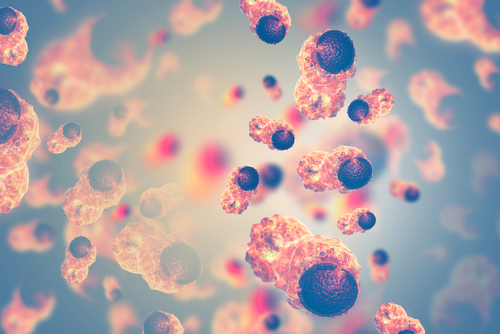
DIAGNOSTIC SERVICES
Molecular- Solid Tumor
The Solid Tumor NGS test at Cairo diagnostics analyzes over 1,000 biomarkers across 52 genes. It detects relevant hotspots, SNVs, indels, CNVs, and gene fusions using a single workflow for DNA and RNA. It enables detection of NTRK1, NTRK2, and NTRK3 gene fusion. Includes solid tumor genes for 23 different types of cancer targeted by on-market oncology drugs and published evidence. It contains 7 genes on 43 labels, 15 genes in 19 guidelines and 43 genes in >900 global clinical trials.
Solid Tumor Gene Panel
Our Oncomine Focus Assay (OFA) is a targeted next-generation sequencing (NGS) panel designed to detect the most clinically relevant genomic alterations across a wide range of solid tumors. This assay consolidates multiple testing methods into a single, streamlined workflow, providing fast and comprehensive insights to support precision oncology.
The OFA interrogates 52 key cancer driver genes, covering the most common classes of alterations, including hotspot mutations, copy number variations (CNVs), and gene fusions . This broad profiling allows simultaneous detection of actionable biomarkers with high sensitivity using limited FFPE tissue samples.
Oncomine Focus Gene Panel
| Hotspot Genes (35 Genes) | |||
| AKT1 | IDH2 | ||
| ALK | JAKI | ||
| AR | JAK1 | ||
| BRAF | JAK2 | ||
| CDK4 | JAK3 | ||
| CTNNB1 | KIT | ||
| DDR2 | KRAS | ||
| EGFR | MAP2K1 | ||
| ERBB2 | MAP2K2 | ||
| ERBB3 | MET | ||
| ERBB4 | MTOR | ||
| ESR1 | NRAS | ||
| FGFR2 | PDGFRA | ||
| FGFR3 | PIK3CA | ||
| GNA11 | RAF1 | ||
| GIVAQ | RET | ||
| HRAS | ROS1 | ||
| IDH1 | SMO | ||
| Copy Number Genes (19 Genes) | |||
| AKT1 | FGFR2 | ||
| ALK | FGFR3 | ||
| AR | FGFR4 | ||
| BRAF | KIT | ||
| CCNDI | KRAS | ||
| CDK4 | MET | ||
| CDK6 | MYC | ||
| EGFR | MYCN | ||
| ERBB2 | PDGFRA | ||
| FGFR1 | PIK3CA | ||
| Gene Fusions (23 Genes) | |||
| ABL1 | FGFR2 | ||
| AKT3 | FGFR3 | ||
| ALK | MET | ||
| AXL | NTRK1 | ||
| BRAF | NTRK2 | ||
| EGER | NTRK3 | ||
| ERBB2 | PDGFRA | ||
| ERG | PPARG | ||
| ETV1 | RAF1 | ||
| ETV4 | RET | ||
| ETV5 | ROS1 | ||
| FGFR1 | |||
Tumor Specific Panels
| Colorectal Panel (14 Genes) | |||||||
| AKT1 | BRAF | EGFR | ERBB2 | ERBB4 | FGFR2 | ||
| FGFR3 | HRAS | KRAS | MET | MAP2K1 | NRAS | ||
| NTRK1 | PIK3CA | ||||||
| Gynecologic Panel (12 Genes) | |||||||
| AKT1 | BRAF | AR | EGFR | ERBB2 | ESR1 | ||
| FGFR1 | FGFR2 | KRAS | MYC | NTRK1 | PIK3CA | ||
| Melanoma Panel (12 Genes) | ||||||||
| BRAF | CDK4 | CTNNB1 | GNA11 | GNAQ | KIT | MAP2K1 | ||
| NRAS | NTRK1 | PDGFRA | PIK3CA | SMO | ||||
| Lung Panel (13 Genes) | ||||||||||
| ATK1 | ALK | BRAF | DDR2 | EGFR | ERBB2 | FGFR1 | KRAS | MAP2K1 | ||
| MET | NRAS | NTRK1 | PIK3CA | |||||||
| Urologic Panel (12 Genes) | |||||||
| AR | ERG | ETV1 | ETV4 | MYC | NTRK1 | ||
| PALB2 | |||||||
Microsatellite Instability (MSI) Testing
Our OncoMate™ MSI Analysis is a qualitative multiplex PCR assay designed to detect microsatellite instability (MSI) in five mononucleotide loci (BAT-25, BAT-26, NR-21, NR-24, MONO-27) using DNA extracted from formalin-fixed, paraffin-embedded (FFPE) tissue. Microsatellites are short DNA repeat regions that are highly prone to replication errors. Normally, these errors are corrected by the DNA mismatch repair (MMR) system; however, in MMR-deficient tumors, MSI occurs, leading to abnormal allele lengths.
By targeting carefully selected mononucleotide-repeat markers, the assay provides high sensitivity and specificity in detecting MSI status. This enables accurate identification of MMR deficiency, supporting both diagnostic and therapeutic decision-making in patients with colorectal and other cancers.
Tumor Mutational Burden (TMB) Testing
Our TMB assay is a targeted next-generation sequencing (NGS) test that provides a robust and accurate assessment of tumor mutational burden (mutations per megabase) across the exonic regions of 409 cancer-associated genes (~1.7 Mb total, including ~1.2 Mb of exonic sequence). By detecting and annotating single nucleotide variants (SNVs) and insertion/deletion variants (INDELs), the assay measures the total mutation load, enabling stratification of tumors as TMB-High (≥10 mut/Mb) or TMB-Low (<10 mut/Mb).
High TMB tumors are more likely to generate neoantigens that elicit an immune response, making TMB a predictive biomarker for response to immune checkpoint inhibitors (ICIs). This assay therefore serves as a critical tool in identifying patients most likely to benefit from immunotherapy and other targeted treatment approaches.













